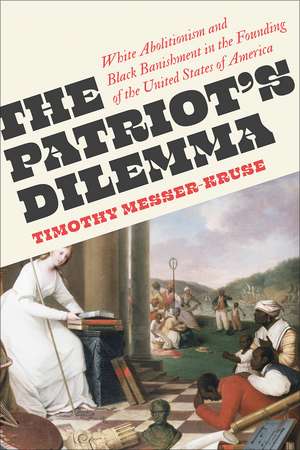The Patriots' Dilemma: White Abolitionism and Black Banishment in the Founding of the United States of America
Autor Timothy Messer-Kruseen Limba Engleză Paperback – 20 apr 2024
'A masterly analysis of slavery and republicanism from the left. A stunning achievement' Gerald Horne, author of The Counter-Revolution of 1776
'In explaining the role of self-interest in the abolition work of the founding generation, Timothy Messer-Kruse broadens debates' Beverly Tomek, author of Colonization and Its Discontents
Timely and controversial, The Patriots' Dilemma confronts longstanding interpretations of U.S. history that emphasize a fundamental conflict between pro-slavery and anti-slavery interests. By 1776, influential American patriots acknowledged that slavery was incompatible with the ideals of the republic. But a republic for whom?
As Timothy Messer-Kruse argues, their real motivations have been misinterpreted for more than 200 years. The Framers were primarily concerned with the protection and betterment of the white community, not the liberation of enslaved black people. The conundrum was that slavery had to end because it created what they saw as a dangerous population, but it could not be abolished without endangering their (white) republic.
Their solutions included schemes to banish former slaves to the western frontier or overseas, to exclude them from the category of 'citizen', to make their emancipation gradual, and to tightly police African American communities.
Timothy Messer-Kruse is Professor of Ethnic Studies at Bowling Green State University in Ohio. He is the author of The Haymarket Conspiracy and The Trial of the Haymarket Anarchists, which was named 'Best Labor History Book' by the journal Labor History.
'In explaining the role of self-interest in the abolition work of the founding generation, Timothy Messer-Kruse broadens debates' Beverly Tomek, author of Colonization and Its Discontents
Timely and controversial, The Patriots' Dilemma confronts longstanding interpretations of U.S. history that emphasize a fundamental conflict between pro-slavery and anti-slavery interests. By 1776, influential American patriots acknowledged that slavery was incompatible with the ideals of the republic. But a republic for whom?
As Timothy Messer-Kruse argues, their real motivations have been misinterpreted for more than 200 years. The Framers were primarily concerned with the protection and betterment of the white community, not the liberation of enslaved black people. The conundrum was that slavery had to end because it created what they saw as a dangerous population, but it could not be abolished without endangering their (white) republic.
Their solutions included schemes to banish former slaves to the western frontier or overseas, to exclude them from the category of 'citizen', to make their emancipation gradual, and to tightly police African American communities.
Timothy Messer-Kruse is Professor of Ethnic Studies at Bowling Green State University in Ohio. He is the author of The Haymarket Conspiracy and The Trial of the Haymarket Anarchists, which was named 'Best Labor History Book' by the journal Labor History.
Preț: 136.70 lei
Nou
Puncte Express: 205
Preț estimativ în valută:
26.16€ • 27.38$ • 21.77£
26.16€ • 27.38$ • 21.77£
Carte disponibilă
Livrare economică 10-24 martie
Livrare express 22-28 februarie pentru 30.16 lei
Preluare comenzi: 021 569.72.76
Specificații
ISBN-13: 9780745349671
ISBN-10: 0745349676
Pagini: 368
Dimensiuni: 155 x 234 x 23 mm
Greutate: 0.49 kg
Editura: PLUTO PRESS
Colecția Pluto Press
ISBN-10: 0745349676
Pagini: 368
Dimensiuni: 155 x 234 x 23 mm
Greutate: 0.49 kg
Editura: PLUTO PRESS
Colecția Pluto Press
Recenzii
'A stunning achievement. Masterly. Finally, an analysis of slavery and republicanism from the left, not seeking to excuse inhumanity by referring to stale recipes about "bourgeois democracy." As the progressive movement in the U.S. begins increasingly to discuss impending fascism, finally we have an account that provides historical foundation for this chilling conception. Brilliant. Insightful.'
Gerald Horne, author, The Counter-Revolution of 1776: Slave Resistance and the Origins of the USA
'In explaining the role of self-interest in the abolition work of the founding generation, Timothy Messer-Kruse broadens debates that generally focus on the motives and efforts of those who supported African recolonization to show that the rhetoric attributed to colonizationists permeates the work of early abolitionists in general. Messer-Kruse takes away the illusion of altruism and replaces it with an honest examination of the role of self-interest in the first generation of antislavery.'
Beverly Tomek, author of Colonization and Its Discontents: Emancipation, Emigration, and Antislavery in Antebellum Pennsylvania
Gerald Horne, author, The Counter-Revolution of 1776: Slave Resistance and the Origins of the USA
'In explaining the role of self-interest in the abolition work of the founding generation, Timothy Messer-Kruse broadens debates that generally focus on the motives and efforts of those who supported African recolonization to show that the rhetoric attributed to colonizationists permeates the work of early abolitionists in general. Messer-Kruse takes away the illusion of altruism and replaces it with an honest examination of the role of self-interest in the first generation of antislavery.'
Beverly Tomek, author of Colonization and Its Discontents: Emancipation, Emigration, and Antislavery in Antebellum Pennsylvania
Notă biografică
Timothy Messer-Kruse is professor of ethnic studies at Bowling Green State University in Ohio. He is the author of numerous books, including The Yankee International: Marxism and the American Reform Tradition, 1848-1876, The Haymarket Conspiracy: Transatlantic Anarchist Networks and The Trial of the Haymarket Anarchists: Terrorism and Justice in the Gilded Age, which was named 'Best Labor History Book of 2012' by the journal Labor History.
Cuprins
Introduction
1. White Abolitionism and the Invention of the White Nation
2. Abolishing Slavery By Abolishing The Slave
3. White Liberty vs. Freedom’s Anarchy
4. Patriot Dreams of Black Banishment
5. The Invention of White Citizenship
6. Gradual Emancipation as Racial Cleansing
7. The Patriots’ Solution: Civil Slavery
1. White Abolitionism and the Invention of the White Nation
2. Abolishing Slavery By Abolishing The Slave
3. White Liberty vs. Freedom’s Anarchy
4. Patriot Dreams of Black Banishment
5. The Invention of White Citizenship
6. Gradual Emancipation as Racial Cleansing
7. The Patriots’ Solution: Civil Slavery
Descriere
A provocative interpretation of early US history arguing that abolitionism among the founders was motivated by white racism
